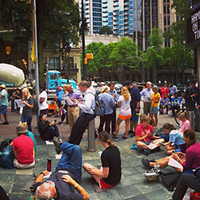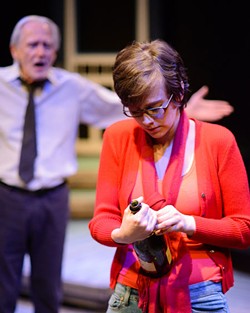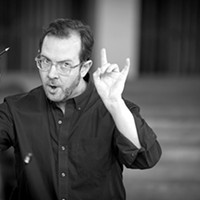As Christian as the concept may be, forgiveness is not at all pervasive in theater works, especially in drama, where there's more mileage per grudge. Yet in Proof, David Auburn's 2001 Pulitzer Prize-winning drama now at CAST through June 1, forgiveness is as crucial to our heroine's growth and mental well-being as self-respect. People that Catherine counts on have let her down, set her back, betrayed her trust. She needs to get past it.
None of Catherine's tribulations occur in the context of religion. Her world, as she turns 25, is the world of her famous mad father, the world of mathematics, where both sides of an equation must balance: an eye-for-an-eye realm, like tragedy. Inexorably, the years when a genius mathematician produces his or her best work are slipping away. She may be past her peak already, like her father was when he was still young. After taking care of him during his last years, watching him cram an attic full of notebooks filled with nothing but raving jibberish, she's afraid she might go insane like he did.
We meet Catherine as she's conversing with her dead father Robert in their Chicago backyard. We have the combustible mix of her lonely 25th birthday, her father's funeral the next day, and a bottle of cheap champagne. Depression, yearning, madness or booze may be the cause of Auburn's opening scene.
Two people visit Catherine in her misery. Elder sister Claire swoops in from New York and offers to spirit Catherine away. Given the utter incompatibility of the two sisters, Claire's transplant proposition seems less likely to mean living blissfully under the same roof than institutionalization for Catherine.
Then there's Harold "Hal" Dobbs, one of Robert's former dissertation students, rummaging up in the attic, hoping that one or two of those 103 notebooks, scribbled during a rare spurt of lucidity, might contain a germ of his revered teacher's genius. Is he partly hanging around because he's sweet on Catherine? Or is he an opportunist using Catherine's interest in him as a way to poach on the unharvested fruit of Robert's final days?
From out of that pile of notebooks, two emerge that turn the plot. One of them hearkens elegantly back to the day Catherine first encountered Hal exactly two years earlier. The other notebook, far more precious, is linked up with the title of the show — and double-wrapped in mystery.
Credit Karina Roberts-Caporino, who can turn from frowzy and plain to vivacious and comely within the space of a sentence, for making Catherine geeky, shy and vulnerable, neurotic, defiant and flirtatious — with some depth to each of those traits. In some ways, the avuncular George Gray is the father Catherine would like to remember, though there's a nice vein of selfishness in the flashback to the lucid Robert. Compared with the vulgar, conventional and irritating Claires we've had in Charlotte and Davidson, Frances Bendert is cooler, more calculating, with only a touch of phony solicitude. When Josh Gaffga did Hal for Charlotte Rep in 2002, he was a likable and enigmatic rock 'n' roll geek, quite different from the fumbling sleazeball take by John Cunningham in the Davidson College production. Here we get a charming, earnest Hal from Scott Alexander Miller, one we can root for until we must feel sorry for him.
What's seriously missing here is intensity. One way or another, director Tony Wright is to blame. Unlike Booth Playhouse, where actors feel compelled to project, the coziness of the CAST arena space seems to lull them into a false sense of security. With a beautiful set design by James Burns, Jr., that practically overhangs the audience on four sides, flanked by a picturesque swing and a grubby chain-link fence, there must be a sense that you don't need to project largely and theatrically. Bendert and Roberts-Caporino are the ones who frequently succumb. When the sisters conversed on the other side of the stage, they couldn't be understood on my side. Even the otherwise flawless Miller gets sucked into the vortex of inaudibility when he parleys with Bendert over yonder by the chain-link fence.
Inevitably, the underpowered performance seeps into the most powerful moments of the drama. When Robert delivers his climactic monologue in Act 2, Gray's matter-of-fact everyday realism doesn't deliver nearly the same impact or shock as Graham Smith's fiery rampage did in 2002. Moments by Roberts-Caporino that should be starkly pointed at the end of Acts 1 and 2 are done with a casualness that robs them of finality. Until I went back and re-read my 2002 review, I'd forgotten there even was a big monologue for Catherine after intermission. That's a shame. For when I could hear her, Roberts-Caporino was making Catherine a far more interesting person in Act 1 than I'd ever seen before.
Speaking of...
-

Charlotte’s top Memorial Day destinations, according to Lyft riders
May 24, 2019 -

'Hamilton' Arrives This Week, Lifting Local Artists or Eclipsing Them?
Oct 10, 2018 -

The Mind of Matt Cosper
May 31, 2017 - More »
Latest in Performing Arts
More by Perry Tannenbaum
Calendar
-
An Evening With Phil Rosenthal Of "Somebody Feed Phil" @ Knight Theater
-
Kountry Wayne: The King Of Hearts Tour @ Ovens Auditorium
-

NEW WINDOW GALLERY-Pat Rhea-ACRYLIC PAINTINGS-April 05-30 2024 VALDESE, NC 28690 @ New Window Gallery/Play It Again Records
- Through April 30, 12 p.m.
-

Trap & Paint + Karaoke @ Zodiac Bar & Grill
-

LIVE MUSIC FRIDAYS!!! @ Elizabeth Parlour Room
-
Fall Guide: Upcoming festivals, comedy shows, visual arts events and more
-
Failure To Communicate
Worthy play could use more nuance
-
Susan Brenner Examines Upheaval While Celebrating Trees
Chaos and beauty













